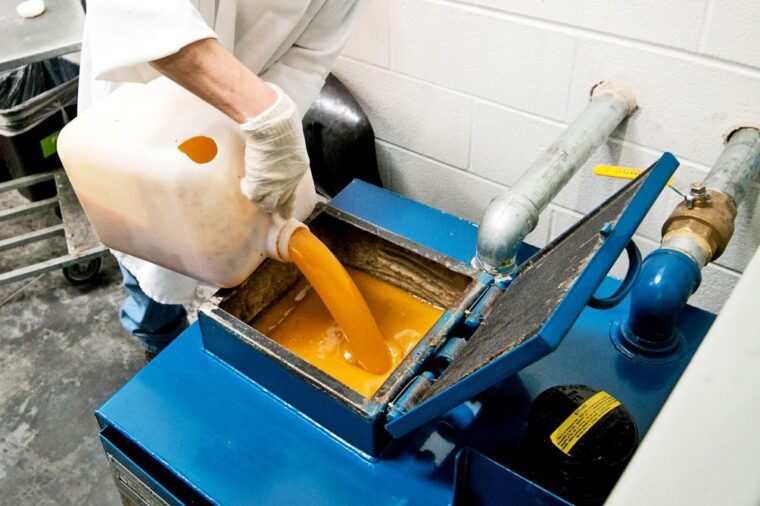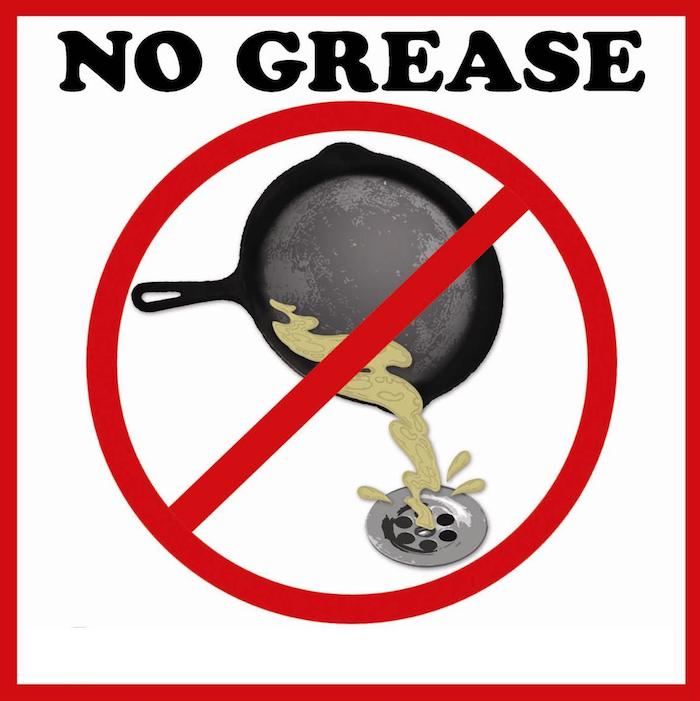Grease waste is annoying, but it’s an inevitable part of any commercial kitchen. It has to be regulated, otherwise, it could turn into a huge problem: strong odors, blocked pipes, sewer infestation, and more. So, how can you avoid this outcome?
It’s actually not that hard, although it will require you to invest some additional effort. Still, preventing these issues from happening is much more cost-effective than dealing with them later on, so it’s definitely something worth your time.
So, where to start?

Pro-tip number 1: Never let the grease down the sink!
All right, some grease going down the drain is unavoidable, but make sure to organize your kitchen so this happens in minimal amounts. The smaller the amount of grease that gets to the pipes is, the fewer problems you’ll have in the long run. Even if it doesn’t seem like a big deal right now, once all of that grease solidifies and starts blocking your pipes, you’ll wish you’ve never done it.
Drain blockage will not only disrupt your daily activities, it will make them impossible. Clogged drains tend to produce a pungent odor that will keep everyone miles away from your business.
Pro-tip number 2: Wipe the pans and use the bin!
So, now you know you should never pour grease directly into your sink, but the question has to be asked: Where should the grease go instead? If the FOG (Fat, Oil, and Grease) layers are tin, use a disposable paper cloth to wipe the dishes before washing them. Of course, this will not work when you’re dealing with high amounts of grease. Instead, you should put the oils, grease, and other harmful waste inside of a small, disposable, watertight bag, seal it and dispose of it in the trashcan.
Other than that, replace your kitchen tools with those that require fewer oils and grease! It might be an expensive investment right now, but it will certainly pay off in the long haul.

Pro-tip number 3: Recycle!
All right, it might sound a bit weird, but it’s the truth: fryer oil is recyclable and you can make additional income out of it! There are companies that purchase the used oil to turn it into a type of biodiesel fuel.
Of course, some non-profit organizations can help you dispose of the oil quickly and safely. FOG’s can be devastating to our waters, so it’s of the utmost importance that we prevent it from entering the water system.
Overall, recycling fryer oil might be the best way to get rid of it. It can become a passive source of income for you, and it helps save the environment! Biodiesel fuels that are made from these recycled materials are biodegradable and non-toxic!
Pro-tip number 4: Keep the kitchen clean!
Frequently cleaning your kitchen will prevent grease from entering the drains. Of course, all commercial kitchens should be clean; it’s a matter of safety and proper hygiene. You don’t want your employees to injure themselves by slipping on the grease. Other than that, a lot of the kitchen floor grease will ultimately end up in the drains. So, clean your kitchen as frequently as you can! In this way, you’ll be able to avoid any unnecessary issues.
Whatever you do, make sure to invest in proper cleaning equipment and train your cleaning staff well. They will have to know how to handle the provided tools and how to dispose of FOG waste properly.

Pro-tip number 5: Clean the grease trap!
The grease trap is the plumbing device that keeps your sewer system safe from any grease blockage. It’s an essential device for all commercial kitchens, and it many places it’s required by law. Still, this useful device can malfunction if not cleaned regularly, so make sure to clean it as often as you can.
Of course, since it can be a bit messy, you should consider getting the professionals to do it for you. Leaving your grease trap in the hands of the professionals like those at greasetrapchicago.com is a time-efficient, cost-effective, and trouble-free way to manage your grease waste.
Whatever you decide to do, keep in mind that your grease inceptor has to stay clean. Therefore, whether you decide to do it yourself, or hire a plumbing service for the job, the important thing is that it’s done properly and frequently.
Pro-tip number 6: Put a “No Grease” sign above the sink
You have to make it clear to your staff that they must never allow the grease to get to the kitchen drains. Put the “No grease” signs everywhere to remind them about it. Yes, it might annoy them a little bit, but they’ll get used to it right away.
Educate your staff about the importance of proper grease disposal. Make sure to talk about it to the new hires, and keep the signs up all the time so nobody gets distracted or forgets the rules for a moment. Of course, mistakes do happen, and it’s not a big deal. What’s important is to minimize the grease build-up, so as long as you train your staff and organize your kitchen properly-you’ll be fine.

Pro-tip number 7: Clean the exhaust filters
If FOGs start accumulating around your exhaust filters, your entire kitchen might be at risk for a serious fire. In this way, you’ll be putting not only your property at risk but also your employees. Make sure to avoid this at all costs!
Other than that, ensure your staff is well trained and knowledgeable about potential risks and hazards at the workplace.
The conclusion
Grease waste can be a huge problem if not managed properly. You have to make sure to get a quality grease trap installed, train your staff, clean up the kitchen, and never let grease near the drains. In this way, you’ll prevent many nasty drainage issues which will save you a lot of time, effort, and money.
As long as you follow the tips and tricks mentioned in this article, you’ll be able to avoid all unnecessary issues that grease waste can cause.
